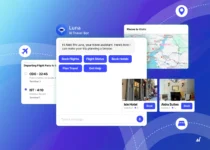The Impact Of Artificial Intelligence on Marketing
Artificial Intelligence (AI) is the simulation of human intelligence processes by machines. Marketing, on the other hand, is the process of identifying, anticipating, and satisfying customer needs profitably. In recent years, AI has gained significant popularity in the marketing industry due to its potential to revolutionize the way businesses approach marketing. In this blog, we’ll explore the impact of AI on marketing, including its use, advantages, challenges, future potential, and the role of human expertise.
The Use of AI in Marketing
AI has revolutionized marketing by enabling businesses to gain a deeper understanding of their customers and personalize their marketing strategies. Some common applications of AI in marketing include:
1. Personalization of marketing strategies
AI-powered algorithms can analyze large amounts of customer data and use the insights obtained to tailor marketing campaigns to individual preferences, behaviors, and interests. This personalized approach not only enhances the customer experience but also increases the effectiveness of marketing efforts.
2. Predictive analysis and forecasting
AI can predict future customer behavior based on past interactions, allowing marketers to anticipate customer needs and preferences. This forecasting capability helps businesses optimize their marketing strategies and stay ahead of the competition.
3. Automation of marketing processes
AI-powered tools can automate repetitive marketing tasks such as email campaigns, social media scheduling, and lead scoring. This automation saves time and improves efficiency, allowing marketers to focus on more strategic activities.
4. Chabot’s and customer service
AI-powered chatbots can provide 24/7 customer support, answering customer questions and resolving issues quickly and efficiently. This level of responsiveness enhances the customer experience and builds trust in the brand.
5. Targeted advertising
AI can analyze customer data to identify specific segments and deliver targeted ads to those audiences. This approach helps businesses optimize their advertising spend and increase the effectiveness of their campaigns.
Advantages of Using AI in Marketing
The use of AI in marketing offers several benefits, including:
A. Increased efficiency and productivity
AI-powered automation and optimization tools can handle repetitive tasks, freeing up marketers’ time to focus on more strategic activities. This increased efficiency and productivity lead to cost savings and improved ROI.
B. Improved customer experience
Personalized marketing strategies, chatbots, and predictive analysis help businesses deliver a seamless and tailored customer experience. This customer-centric approach enhances brand loyalty and increases customer satisfaction.
C. More accurate insights and analysis
AI can process large amounts of data quickly and accurately, providing marketers with deeper insights into customer behavior and preferences. This level of analysis enables businesses to make data-driven decisions and optimize their marketing strategies for better results.
D. Cost efficiency
AI-powered automation and optimization tools can reduce costs associated with manual labor, human error, and inefficient processes. This cost savings allows businesses to invest more in marketing efforts that drive growth and revenue.
E. Enhanced targeting and segmentation
AI-powered analysis and targeting tools enable businesses to identify specific segments and deliver tailored marketing messages to those audiences. This targeted approach improves the effectiveness of marketing efforts and reduces wasted spend.
Challenges of Using AI in Marketing
While the benefits of using AI in marketing are clear, there are several challenges that businesses need to address, including:
A. Data quality and privacy concerns
AI relies on high-quality data to deliver accurate insights and analysis. However, businesses need to ensure that the data they collect is ethical, legal, and secure. Failure to do so can lead to privacy breaches, legal liabilities, and reputational damage.
B. Bias and ethical issues
AI algorithms are only as good as the data they are trained on. If the data is biased or incomplete, it can lead to unfair or discriminatory outcomes. Businesses need to ensure that their AI systems are transparent, accountable, and free from bias.
C. Lack of expertise and resources
Implementing AI in marketing requires specialized expertise and resources that may be challenging for some businesses to acquire. Companies need to invest in training, hiring, and partnering with AI experts to ensure successful implementation.
D. Integration with existing systems
Integrating AI-powered tools with existing systems can be challenging, and businesses must ensure that they have the right infrastructure and support in place to do so effectively.
V. Future of AI in Marketing
A. Growth Potential
The growth potential of AI in marketing is enormous. According to a report by Markets and Markets, the global AI in marketing market is expected to grow from $5.2 billion in 2019 to $40.1 billion by 2025. This growth is driven by the increasing adoption of AI in marketing automation, customer analytics, and content optimization.
B. Emerging Technologies
AI is constantly evolving, and new technologies are emerging that promise to transform the marketing industry even further. These technologies include voice search, virtual and augmented reality, and blockchain. By leveraging these technologies, marketers can deliver more personalized and immersive experiences to their customers.
C. Evolution of Consumer Behavior
As AI becomes more prevalent in marketing, consumer behavior is also evolving. Customers are increasingly expecting personalized experiences that cater to their individual needs and preferences. This has led to the rise of “hyper-personalization,” where marketers use AI to deliver highly targeted and relevant content and offers to their customers.
D. Role of Human Expertise
While AI has the potential to automate many tasks in marketing, it’s important to remember the role of human expertise. Marketers still need to provide the creativity and strategic thinking that AI can’t replicate. Human oversight is also necessary to ensure that AI is used ethically and in compliance with regulations.
VI. Conclusion
A. Recap of key points
In conclusion, AI is transforming the marketing industry by enabling personalization, customer segmentation, predictive analytics, conversational marketing, and content optimization. However, there are also challenges to be addressed, such as privacy concerns and the need for human oversight. The future of AI in marketing is promising, with significant growth potential and emerging technologies that will continue to shape the industry.
B. Final thoughts and recommendations
To fully leverage the power of AI in marketing, it’s important for marketers to stay up-to-date on the latest trends and technologies. They should also prioritize data privacy and transparency, and as AI continues to evolve, the role of human expertise will become more critical, and businesses should strive to find the right balance between AI and human intervention. By doing so, they can deliver personalized and engaging experiences that drive business growth and customer loyalty.
Thank you for reading! If you found this blog informative, please follow me on Medium for more such content.
I release blogs every Monday and Friday of each week. You can also follow me on LinkedIn and my Instagram page, @jantaverse, to stay current and up-to-date.


